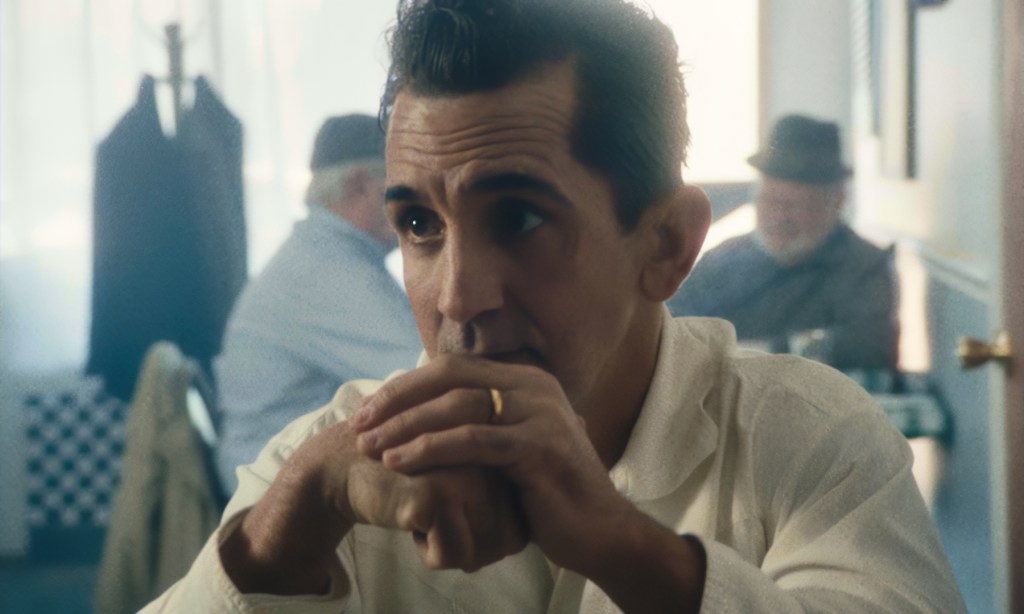An Emmy-nominated documentary cinematographer with credits including “Procession” and “All the Beauty and the Bloodshed,” Robert Kolodny puts his expert eye for shooting nonfiction to playful narrative use in his feature directing debut “The Featherweight.” A meticulously designed, gutsily played biopic of world champion featherweight boxer Guglielmo Papaleo, better known as Willie Pep — covering not his 1940s glory days but his faltering attempt at a comeback two decades later — the film is convincingly fashioned as a candid all-access documentary, a promotional puff piece curdling before our eyes into an unintended study of mental breakdown.
So convincingly, in fact, that uninformed viewers chancing upon “The Featherweight” on the festival circuit may wonder exactly what it is they’re watching, not least if — in a realization of Pep’s own glumly stated fears — they have no idea who this once-celebrated sportsman was. Kolodny puts nary a foot wrong in his precise replication of a midcentury vérité aesthetic and gaze, from the particular grain and thrust of the camerawork to the authentically abrasive tone and tenor of the performances. (The film’s closing credits include telling hat-tips to D.A. Pennebaker and Albert and David Maysles.)
As a feat of cinematic masquerade, it could hardly be pulled off with any more panache: The term “mockumentary” hardly feels appropriate for a film this reverent of its supposed form, and this toughly loving toward its human subject. It’s effective enough to make one wonder why faux-documentary is typically the domain of Christopher Guest-type comedy rather than drama, though some may find “The Featherweight” more of an immaculate exercise than an emotionally involving experience. (Certainly, one needn’t be versed in Pep’s career to anticipate the film’s entire southbound arc.) Either way, it’s a formidable calling card for much of the talent involved, sure to pick up further festival spots and specialist distribution following its premiere in Venice’s Horizons sidebar.
In boxing-biopic terms, Steve Loff’s screenplay essentially takes as its starting point the place where “Raging Bull” ends — coincidentally the year 1964 in both cases — as the middle-aged, burnt-out fighter embarks on a new career phase that nobody else much believes in. Where Jake LaMotta turned to stand-up comedy, the 42-year-old Pep (James Madio) sets his sights on a kind of screen stardom, inviting a camera crew into his Hartford, Connecticut home to survey both his home life and his relaunched boxing career. The former he shares with his much younger, plainly mismatched fourth wife, aspiring actress Linda (a blazing Ruby Wolf). The latter is very much his own folly, given little encouragement by his long-suffering manager Bob (Ron Livingston) and his frankly skeptical trainer Bill (Stephen Lang), desperately trying to persuade Pep to throw in the towel and take a coaching job in Florida.
The film’s tension lies in the gap between the film Pep thinks he’s making — a homey, salt-of-the-earth comeback-kid story — and the vision of those behind the camera, clearly chasing a harder, uglier reality. (The fictional filmmakers, a fraternal duo that parallels Kolodny and his brother/DP Adam, aim for a non-interventionist approach but offer occasional off-screen commentary — at one point even offering Linda words of sympathy after a vicious marital spat, while refusing her request to turn off the camera.) As much as Pep tries to manage his scrappy, salt-of-the-earth image, holding court with family and friends while he reflects on past triumphs and repeats stale anecdotes, the on-camera narrative too easily spirals out of control: His marriage splinters as he tries to thwart Linda’s career goals, while the reemergence of his estranged, drug-addicted son Billy (Keir Gilchrist) draws unwelcome attention to his shortcomings as a father too.
The thornier and more tortured “The Featherweight” gets as a character study, then, the more panicked and paranoid Pep grows as an onscreen presence — all while his boxing plans are dealt some inevitably humiliating blows. Gifted the role of his career after 30 years of steady supporting work, a superb Madio (best known for TV’s “Band of Brothers”) plays the unraveled champ with a violent, underlying defensiveness that belies the jovial paisan air he keeps feigning for the camera: Threat and insecurity are even bound up in the expectant way he tells his hoary, much-practised jokes. His truest, ugliest self tends to emerge in his increasingly frequent set-tos with Linda, whose impatience with his documentary persona gradually wears through even her considerable acting ability. As a trophy wife abandoned in pursuit of other prizes, Fox is sorely affecting, her worldly poise crumpling as Linda’s inexperience is exposed and abused.
Mixing cleverly vintage-fashioned digital lensing with 16mm and Super 8 stock for the film’s 1940s boxing sequences — thus conveying a sense of graduated weathering between eras — the Kolodnys consistently maintain an immersive, on-the-fly aesthetic, attentive to what was then a bracing modernity of filmmaking technique, even within the film’s painstaking period look. Sonia Foltarz’s production design and Naomi Wolff Lachter’s costuming are fully complicit in the illusion; Robert Greene’s editing is smartly mindful of mid-’60s documentary pacing and construction, and deft in its splicing of archival footage amid the dazzling reconstruction. There’s no pointed cutaway here to the “real” Willie Pep; “The Featherweight” holds to its version of reality to the last.
Read More About:
Source: Read Full Article
